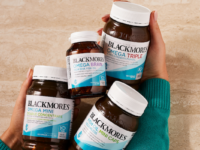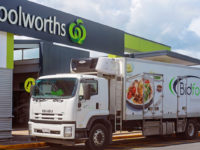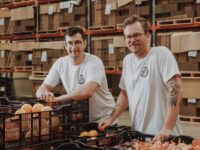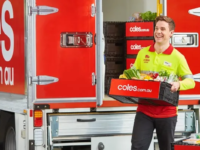
With a focus on healthy foods with real ingredients, best friends Stephanie Smith and Laura Henshaw, along with Tom Paton and Jim de Fegely, form the core of a growing business.
In modern day marketing, influencers are considered an invaluable tool, with brands big and small turning to social media stars to promote their wares. But what happens when the influencers start influencing FMCG?
Best friends Stephanie Smith and Laura Henshaw have garnered a huge following in recent years based on their healthy lifestyle approach through the Keep it Cleaner brand.
What started off as two friends baking gluten-free muffins and healthy pancakes at home has now developed into a grocery range spanning five categories in the nation’s biggest supermarkets.
Tom Paton and Jim de Fegely teamed up with the duo to form Metro Food Co in 2017 with the view of taking their brand to the next level. Today, Metro Food Co is now one of the fastest-growing food companies in Australia.
The Melbourne-based business now outsources production of its 80+ products to suppliers in Australia and overseas. The range, which includes the original pancake and muffin mixes as well as chickpea, green pea and red lentil pasta, gluten-free pasta sauce and porridge, sports snacks and much more, sells under the Keep it Cleaner brand in hundreds of Coles, Woolworths, IGA and 7-Eleven stores.
Last year the business made another big leap forward with the addition of former CEO of Asahi Premium Beverages Asia Pacific, Greg Ellery, joining as chairman.
Metro Food Co CEO Tom Paton sat down with Inside FMCG to share some further insights into the next gen food business.
Inside FMCG: Can you tell us about how Metro Food Co met Keep it Cleaner?
Tom Paton: Steph and Laura created the brand Keep it Cleaner a number of years before myself and Jim [de Fegely] ended up approaching them about the opportunity to develop a grocery range. They wanted to create some content which would help young females specifically who are growing up in the world of social media, and created an e-book with recipe ideas and healthy lifestyle ideas. It became an amazing success for them and from there, Keep it Cleaner really took off.
Jim and I saw a fantastic opportunity within Steph and Laura and the Keep it Cleaner brand to create a grocery range which would stretch outside of them selling products online to making products available to all Australians through the major retailers, Coles and Woolworths. We caught up and within three months we had product on the shelf at Coles, which was fantastic. One, because Steph and Laura saw a great opportunity to work with Jim and myself, and Coles saw a fantastic opportunity to partner with a young millennial business focused around health and wellness.
Inside FMCG: So how do you turn a brand from a social media sensation into something that has long-term sustainability in retail?
TP: My background is in grocery and the girls’ background is in lifestyle, health and wellbeing. I look at the grocery sector and many products that fit in the health food aisle probably don’t deserve to be there. A product might be there because it’s gluten free but the first ingredient is sugar, which is counterintuitive to the purpose of being in health foods. We look at opportunities where consumers are being let down by health and nutrition and we try to bring a balanced lifestyle approach to the way that we retail products.
The girls communicate the same message outside of the grocery business in the sense that as long as you’re eating healthy and exercising regularly enough, there’s no reason why you can’t have a glass of wine or indulge in gluttonous food every now and then; it’s really just about having a balanced lifestyle. If you look at the way that both Steph and Laura communicate to their audience, the whole strategy and the whole communication is built around trust and transparency. As a business we purposely won’t pigeonhole ourselves into a business that is anti-sugar or must be vegan or has to be gluten-free. We’re really a well rounded business that just focuses on improving the nutritional aspects of products that people can consume well every day.
Inside FMCG: The company describes itself as “the next generation of FMCG innovators”. What is it about Metro Food Co that makes it different?
TP: I think the fact that Steph and Laura themselves are millennials, so we’ve got two business partners and two key figure heads of our company who themselves are consumers of the market that we’re appealing to. So every decision that is made throughout the business, whether it’s the ingredients that go into a product or the manufacturing process, or the sustainability of our packaging, is made by an audience who at the end of the day is buying a product.
We scale the globe year round, having a look at what’s happening in other markets globally, and then we come back and we look at what we think Australia is ready for and what we think our customer is ready for. Between the key players within our organisation we then decide what we think is next in the form of innovation and we always challenge ourselves to be the first to market to bring that opportunity to consumers in Australia.
Inside FMCG: How has the manufacturing side of things scaled up as the business has developed?
Often [Steph and Laura] referred to the fact that they would be doing predominantly 80 per cent of their grocery shop through local boutique health stores but then having to finish the remainder through Coles and Woolworths. Local boutique health stores aren’t accessible to everyone so we want to make these health food products available to every Australian in the country. They gave us a list of what they saw being great opportunities and then Jim and I had to explain the way that the manufacturing world works, in the sense that to make products achieve six months’ or 12 months’ shelf life different processes take place to enable that product to be able to hit the shelves. So we had a beautiful brand viewpoint and then we had a manufacturing and retail viewpoint. Collectively we were able to refine the range in a way that allowed us to launch seven products with Coles in the chilled health category achieving six months in shelf life, and the products were a huge success.
Inside FMCG: What categories does the business focus on?
TP: We now operate across five different categories: chilled health, health pantry, health snacking, baby food and sports nutrition. We intend to launch products in any category that exists where we genuinely think we can add value or improve the nutritional content of those products. In two years, we’ve been able to penetrate five categories. Do we see that growing? Definitely. Over the next 12 months, we will be starting to move down into more mainstream aisles and further away from traditional health and providing better value products down those aisles where most of the foot traffic in Australian retail moves.
Inside FMCG: Can you tell me a bit about the decision to bring Greg Ellery on board?
TP: If you look at our business everyone, bar Greg, is our consumers. The average age in our office would be about 24, which is scary, but it’s fantastic. The purpose of bringing Greg on board is really to come in and help steer the ship every now and then. I’d be the oldest employee in the business at 31, and I think bringing someone on board of Greg’s calibre, who’s had as much experience in the FMCG industry as he has, will be hugely beneficial.
He also has had huge success throughout Asia Pacific, and with our baby food and health health food ranges, a lot of our focus is going to be moving into into the ASEAN region. We will have a big focus on Singapore, Hong Kong and want to look into Thailand and Cambodia. I think once we have proved a successful blueprint in one or many of those regions, it will open up the door for us to comfortably move into mainland China.
Inside FMCG: What trends do you expect to see really take hold this year?
TP: I don’t think there’s going to be any slowdown in vegan, to be honest with you. I think we might actually see a trend of brands moving from a vegan claim to a plant-based claim. The claim of vegan does come with some negative connotations. Why they exist I don’t really know, that’s just how people choose to perceive it. But by using the reference of plant-based, it softens that category and it allows people to feel like they’re going to be having a more healthy and balanced diet.
I think we’re going to continue to see growing trends around minimalist ingredients and brands globally looking at ways that they can refine their ingredient list and provide a more suitable product to the market, removing numbers, fillers and so on.
I think the biggest trend that we will see from January onwards will definitely be around sustainability. Sustainability comes from a number of different areas, whether it’s sustainable sourcing of raw materials, working conditions where those materials are sourced, etc. I think the most innovation will be coming from packaging sustainability.
Inside FMCG: Are you interested in exploring the plant-based meat trend as a business?
TP: I find the whole category interesting, to be honest with you. At this point in time, we don’t see the Keep it Cleaner brand going down the plant-based meat category. That being said, it’s incredibly high growth and a very exciting category, there’s a huge amount of demand for it, but we’re purposely trying to steer away from that. Our business is focused around manufacturing products which don’t have any numbers or supporting ingredients or raw materials that go towards making sure the product is shelf stable. Plant-based products are fantastic in the sense that it’s a far more sustainable source of protein. However, the technology I don’t think is quite there, if you look at the ingredients listing on the back of plant-based meat products. We want to launch products where every member of the household is familiar with the ingredients on the back of the pack.
This interview was first published in the quarterly edition of Inside FMCG magazine. Subscribe to print or digital here.
















